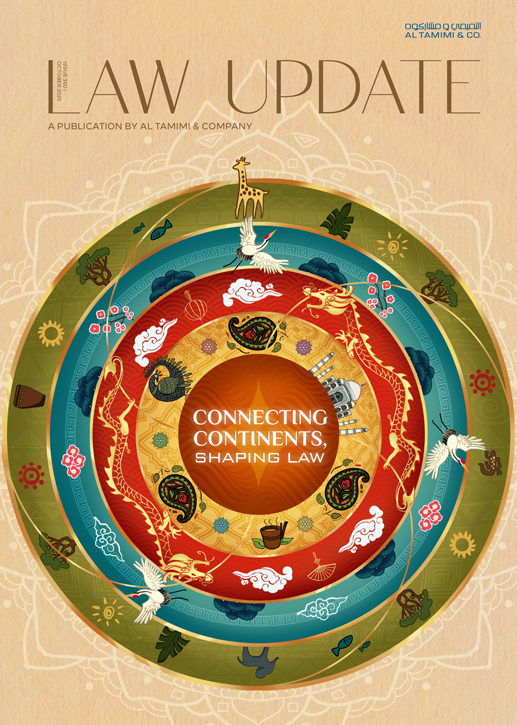- Arbitration
- Banking & Finance
- Capital Markets
- Commercial
- Competition
- Construction & Infrastructure
- Corporate / Mergers & Acquisitions
- Corporate Services
- Corporate Structuring
- Digital & Data
- Dispute Resolution
- Employment & Incentives
- Family Business & Private Wealth
- Innovation, Patents & Industrial Property (3IP)
- Insurance
Find a Lawyer
Book an appointment with us, or search the directory to find the right lawyer for you directly through the app.
Find out more
Africa & Asia
Connecting Continents, Shaping Law
This month, our focus turns to Africa and Asia, two regions reshaping global growth and investment. From Egypt’s ongoing legal and economic reforms and the strengthening of UAE–Moroccan relations, to the rise of Korean investment across the Middle East, this issue highlights the developments driving change across these markets.
We also explore the UAE’s role as a bridge between regions – a hub for private wealth management, dispute resolution, and cross-border collaboration, connecting businesses and investors across Africa and Asia. The articles in this edition offer practical insights into how these shifts are influencing trade, regulation, and market confidence across the wider region.


2025 is set to be a game-changer for the MENA region, with legal and regulatory shifts from 2024 continuing to reshape its economic landscape. Saudi Arabia, the UAE, Egypt, Iraq, Qatar, and Bahrain are all implementing groundbreaking reforms in sustainable financing, investment laws, labor regulations, and dispute resolution. As the region positions itself for deeper global integration, businesses must adapt to a rapidly evolving legal environment.
Our Eyes on 2025 publication provides essential insights and practical guidance on the key legal updates shaping the year ahead—equipping you with the knowledge to stay ahead in this dynamic market.
The leading law firm in the Middle East & North Africa region.
A complete spectrum of legal services across jurisdictions in the Middle East & North Africa.
-
Practices
- All Practices
- Banking & Finance
- Capital Markets
- Commercial
- Competition
- Construction & Infrastructure
- Corporate / Mergers & Acquisitions
- Corporate Services
- Corporate Structuring
-
Sectors
-
Country Groups
-
Client Solutions
Today's news and tomorrow's trends from around the region.
17 offices across the Middle East & North Africa.
Our Services
 Back
Back
-
Practices
- All Practices
- Banking & Finance
- Capital Markets
- Commercial
- Competition
- Construction & Infrastructure
- Corporate / Mergers & Acquisitions
- Corporate Services
- Corporate Structuring
- Digital & Data
- Dispute Resolution
- Employment & Incentives
- Family Business & Private Wealth
- Innovation, Patents & Industrial Property (3IP)
- Insurance
- Intellectual Property
- Legislative Drafting
- Private Client Services
- Private Equity
- Private Notary
- Projects
- Real Estate
- Regulatory
- Tax
- Turnaround, Restructuring & Insolvency
- Compliance, Investigations and White-Collar Crime
-
Sectors
-
Country Groups
-
Client Solutions

- Law Firm
- /
- Insights
- /
- Law Update
- /
- Saudi Arabia: Transformation of the Kingdom
- /
- Social & Cultural Reforms for Women in Saudi Arabia and the impact on the workforce
Social & Cultural Reforms for Women in Saudi Arabia and the impact on the workforce
Mohsin Khan - Partner - Employment and Incentives
Farha Leadbetter - Senior Counsel - Employment and Incentives
Introduction
A number of recent reforms have placed women in Saudi Arabia at the forefront of the country’s reform agenda marking a significant turning point in the country’s history. Increased female participation in the labour force is seen as essential to the success of the Vision 2030 plan and this goal has been met a decade early with increasing numbers of female workers entering the labour market in recent years.
“Increased female participation in the labour force is seen as essential to the success of the Vision 2030 plan”
Having invested for generations in the education of Saudi women, the return on investment is evident and the Government remains strongly committed to female empowerment according to Ministry of Human Resources and Social Development (MHRSD). Across age brackets, education levels and varying socio-economic backgrounds, women continue to be a growing presence making up 33% of Saudi’s labour force, nearly double what it was five years ago. With looser restrictions on segregation, driving and the male guardianship system, employers are hiring more women than ever as new laws and regulations have made it easier for women to work in client-facing jobs across a variety of sectors.
According to the World Bank, the business reforms made by Saudi Arabia have played a fundamental role in boosting and diversifying economic growth in the Kingdom. In providing funding to many projects and initiatives, opportunities have been created for women both in government and the private sector. By fostering a culture of safety, growth and innovation, there has also been an increase in the number of dynamic female leaders and entrepreneurs in the Kingdom. Additionally, statutory employment rights, state benefits for the vulnerable and pensions are some of the reform programs that have benefited most from more female inclusion.
Labour and other Reforms
A key factor in enabling and empowering women to increase participation in civic life was the criminalization of sexual harassment in May 2018 with the Anti-Harassment Law, demonstrating the Kingdom’s commitment to ensuring a safe society and providing means to enforce legal rights and protections. This was swiftly followed by the lifting of the driving ban for women in June 2018, removing what was considered to be a barrier to participate in the labour market as well as wider society.
Other decrees followed thereafter and, on 31 July 2019, the Council of Ministers issued a decision amending the Travel Documents Law, the Civil Status Law, and the Labour Law.
These amendments included changes to the male guardianship system so that women over the age of 21 were free to leave the house unaccompanied, and the equalizing of women’s right to choose a place of residency.
New childcare centers were established and labour related subsidies made available to help more women leave the home. Pension equality was also introduced by equalizing the retirement age for men and women, and mandating pension care credits for maternity leave.
Changes to the Labour Law clarified that a “worker” could be female as well as male and discrimination based on gender in employment was also prohibited, as were the dismissal of pregnant women and discrimination based on gender in accessing credit which particularly benefits female entrepreneurs.
“The Government remains strongly committed to female empowerment according to Ministry of Human Resources and Social Development”
Anti-Harassment Law 2018 and subsequent developments
The Anti-Harassment Law of May 2018 defines sexual harassment as “all conduct of a sexual nature from one person to the other, including touching of the body, honour or modesty in any way, shape or form”. The definition also applies to electronic communications such as social media.
This legislation, a reinforcement and extension of the safeguards of privacy, dignity and personal freedom already provided for under Islamic Law (Shar’iah), was considered vital to the success of modern social change as it guaranteed the rights and safety of women in the workplace as well as in other areas of society.
It grants victims the right to anonymity and allows courts to fine perpetrators up to SAR 300,000 and imprison up to 5 years, giving women the confidence and legal protection to freely participate and contribute to working society.
Following on from the Anti-Harassment Law, the MHRSD issued a Ministerial Resolution that introduced protections against behavioural abuse in the workplace in October 2019. The Resolution sets out procedures and requirements which employers have to comply with in order to safeguard the privacy, dignity and personal freedom of the individual and protect against behavioural abuse, which includes any acts of harassment, insult, offence as well as any form of discrimination. The Resolution prescribes a number of measures that must be taken by employers to protect employees from behavioural abuse and reflects the commitment of the Saudi authorities to ensure a safe working environment as workforces become increasingly diverse.
Conclusion and Timeline
With women forming approximately 45% of the Saudi Arabian population, further social reforms affecting the labour force are inevitable. Draft amendments to the Labour Law suggest further enhancements of statutory rights for female employees. As the number of female graduates entering the labour market every year continues to grow, it is expected that the pace of change will continue as Saudi Arabia continues to work towards Vision 2030.
“With women forming approximately 45% of the Saudi Arabian population, further social reforms affecting the labour force are inevitable”
For further information, please contact Farha Leadbetter or Mohsin Khan.
Stay updated
To learn more about our services and get the latest legal insights from across the Middle East and North Africa region, click on the link below.


